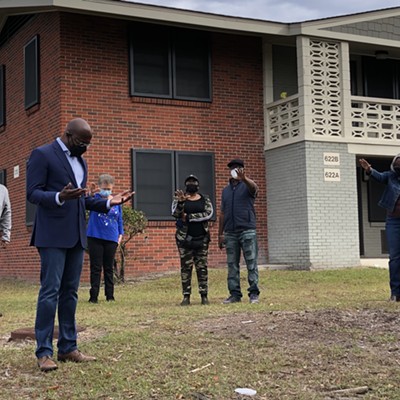Political rhetoric at the national level might lead you to believe that the Constitution is a sacred document. But Georgia’s state Constitution is still very much a work in progress judging by the amount of proposed changes to it on the November ballot.
When voters head to the polls next month there will be five amendments seeking approval of Georgians across the state. Be aware, these changes aren’t exactly the new Bill of Rights, and that means that the truth hidden behind these cleverly crafted bits of policy isn’t exactly self–evident.
So, to help elucidate whether you should vote “yea” or “nay” on these initiatives come November, we’ve gone searching for a bit of clarity.
Amendment 1 – authority to enforce non–compete clauses
“Shall the Constitution of Georgia be amended so as to make Georgia more economically competitive by authorizing legislation to uphold reasonable competitive agreements?”
The vague, seemingly innocuous phrasing of the language that will appear on the ballot has drawn the ire of progressives who claim it masks the potential impacts on employees.
The amendment would give judges authority to interpret non–compete clauses. Currently, if there are even small technical problems with a contract a judge is forced to throw out the whole thing, which makes businesses uncomfortable.
Brett Grayson, the public face of Jobs for Tomorrow, the special interest group supporting passage of the amendment, sees the language as a public service designed to keep the state from missing out on economic development.
“Legislators went through several different editions before they got to language they were comfortable with,” says Grayson. “Part of that goal was to avoid getting into the weeds with the legal language. It just makes people’s eyes glaze over.”
While the opposition sees the amendment as an undue burden on employees who might sign a contract that, if they were fired, would prevent them from finding other work in their chosen profession, the response from supporters is that such a take is misinformed.
“If you know the current law, you know that non–competes could apply to any employee at any level,” Grayson explains. “Under the new law, non–competes are specifically limited to key employees. That’s gonna be your top executives and your managers with access to sensitive data or customer information.”
In the enabling legislation (HB 173) that takes effect if the amendment on the ballot passes, the definition of the “key employees” this new law might apply to is a linguistic study in legal–ese.
According to the bill: “’Key employee’ means an employee who, by reason of the employer’s investment of time, training, money, trust, exposure to the public, or exposure to customers, vendors, or other business relationships during the course of the employee’s employment with the employer, has gained a high level of notoriety, fame, reputation, or public persona as the employer’s representative or spokesperson or has gained a high level of influence or credibility with the employer’s customers, vendors, or other business relationships or is intimately involved in the planning for or direction of the business of the employer or a defined unit of the business of the employer.”
The bill is 18 pages long and reads just like that.
While the new language is supposed to restrict the applicability of non–compete clauses, according to State Congressman Kevin Levitas, the lead sponsor for the resolution that put the amendment on the ballot, “It affects business all the way from mom and pop shops up to large corporations.”
However, “it’s a very limited class of people to whom these types of agreements apply,” Levitas explains.
Some opposition has raised questions about Levitas’ involvement because his wife, who is legal counsel for Huddle House, is also part of the group that incorporated Jobs for Tomorrow with the Secretary of State’s office.
Grayson says one of the major beneficiaries of the changes, besides technology firms, are franchises looking to protect themselves from management employees who are trained and immediately jump ship to open competing businesses.
“If you believe businesses have some right to defend or protect their hard earned success, and their intellectual property, than it follows that you ought to have some clear but very limited rules on how to do that,” says Grayson.
Our take: The deeper you dig into this the more confusing it gets. Georgia is one of only eight states that doesn’t give judges the authority to interpret the intent of business contracts.
Does that make us a bastion of freedom or slow to adapt to the changing world of business? We don’t know, but we get nervous when special interest groups representing big business tell us something is good for any one other than them.
Amendment 2 – Dedicated Trauma Care Funding
“Shall the Constitution of Georgia be amended so as to impose an annual $10 trauma charge on certain passenger motor vehicles in this state for the purpose of funding trauma care?”
There is a definite need for Georgia to improve its trauma care network statewide.
“The death rate from traumatic injuries in Georgia is 20 percent higher than the national average,” says State Senator Greg Goggans, who was the lead sponsor on the resolution to put this amendment on the ballot. “The reason is because we do not have enough trauma centers to serve the 9.5 million people in the state.”
The question becomes not whether this should be done, but how to pay for the expensive changes necessary to see improvements in underserved areas.
If Amendment 2 is approved, the state will add a $10 fee to the cost of vehicle registration for all privately owned cars, trucks and motorcycles. The money would be put in a trust that would be used at the discretion of the state’s Trauma Network System committee, an independent panel of health care professionals and business people.
As of 2008, there were 8.4 million vehicles registered in the state, meaning that more than $80 million per year would be available to improve facilities at existing trauma care facilities, as well as build new facilities or incentive existing hospitals to take the necessary steps to become trauma centers.
If you think all hospitals are the same, think again. In the state of Georgia there are 154 criteria that need to be met in order to be a Level One trauma center (facilities that are equipped to deal with the most severe trauma cases), including the availability of specialized staff and technology. The combination of all these makes the associated expenses a daunting prospect for a financially stable health care institution.
“They’re concerned that if they say they’re a trauma center then they’re gonna get a bunch of unfunded care coming in and change the financial balance of their institution,” says Dr. Gage Ochsner, a trauma surgeon with Memorial and a member of the Georgia Trauma Network System. “It’s important to be able to go in with dedicated funding, so there’s money here to help you offset the cost of being a trauma center.”
Currently, there are only four Level One trauma centers in the state, and Memorial is one the second busiest after Grady in Atlanta.
“We see 2,200 to 2,400 [trauma cases] per year,” says Ochsner. “We cover 24 counties in Georgia and four in South Carolina.”
The difficulty with having a single facility serving such a large geographical area is something called “the golden hour.” Trauma patients who receive care within the first hour after an injury have drastically improved chances of survival.
For children, that window is only about 30 minutes.
If there were more trauma centers spread out across a broader geographic area, it would mean that patients could be stabilized at satellite Level Three trauma centers, or airlifted to the nearest level one.
Although there has been some opposition to this, most notably from the state’s Libertarian Party, they are angrier at the creation of a new tax rather than being motivated by the idea that the trauma network is satisfactory as is.
Goggans recognizes the political danger in increasing fees during the recession. However, he sees the measure as a moral imperative rather than an attack on the earnings of John Q. Public.
“It’s never the wrong time to do the right thing,” he says. “When one, as a citizen, has the ability to give of themselves to save another 1,000 per year in the state of Georgia then it’s the right thing to do.”
Our take: Legislators were hoping the “Superspeeder” law would generate the necessary revenue for this, but the increased speeding fines only generated about 10 percent of what they were hoping. With budget revenues decreasing, the only way to fund this type of initiative is with dedicated funds that aren’t accessible to politicians.
At the risk of sounding like Sally Struthers, for as little as three pennies a day, you can help save lives.
Amendment 3 – Multi–year contracts for Department of Transportation
“Shall the Constitution of Georgia be amended so as to allow the Georgia Department of Transportation to enter into multiyear construction agreements without requiring appropriations in the current fiscal year for the total amount of payments that would be due under the entire agreement so as to reduce long–term construction costs paid by the state?”
Currently, Georgia’s Constitution requires departments’ multi–year projects to be funded upfront, ensuring they’re not carrying over debt into the following year.
“It’s a longstanding principle in Georgia that you have the money on hand to pay for what you’re going to do that year,” says David Spear, Press Secretary for the Department of Transportation.
For the Department of Transportation, this has become a bit of problem. If they are funding a $20 million project using their annual revenue from the motor fuel tax but only need $5 million to cover the costs of the first year, then the other $15 million just sits in an account rather than being used to help start other projects.
For the DOT, allowing projects to be paid for incrementally would increase the number of projects that could be started at once, creating jobs and improving infrastructure more quickly.
Following an audit report last summer that raised serious questions about the DOT’s accounting practices from 2006 through 2008, including what Governor Sonny Perdue described at the time as “Enron–type accounting,” State Transportation Board member Jay Shaw says that things have been straightened out.
“We’ve got more information now than we’ve ever had,” says Shaw. “I can assure you we know where the money is at and where it’s going.”
Our take: We like freshly paved roads, safe bridges and job creation just as much as everybody else. But it’s only been two years since the DOT was accused of borrowing against future revenue and running up $2 billion in debt.
With long term plans for improving the rail system in Georgia, there would certainly be merits to allowing incremental funding of projects, but are we modernizing or opening the door to California–style financial trouble?
Amendment 4 – Multi–year contracts for energy efficiency upgrades
“Shall the Constitution be amended so as to provide for guaranteed cost savings for the state by authorizing a state entity to enter into multiyear contracts which obligate state funds for energy efficiency or conservation improvement projects?”
This amendment is a little different than the DOT’s proposition and in a pretty significant way.
Currently, the state of Georgia spends about $225 million per year on electricity and water for state buildings, according to an estimate from the Georgia Environmental Finance Authority.
The federal Environmental Protection Agency estimates that if the state could reduce utility consumption by 25 percent, the savings would amount to $530 million over 10 years.
So, what this amendment seeks to do is leverage that savings into an investment in making old buildings more environmentally friendly without requiring capital outlay from the state.
This solution, which has garnered broad bi–partisan support, has been on the table a few years and has been enacted in other states with some success.
“Almost every state other than Georgia is doing this — Alabama, South Carolina, Florida,” says Jason Rooks, the spokesman for Taxpayers for Energy Efficiency. “Without the budget problems, it probably wouldn’t have attracted the attention it needed to get done.”
Companies, using a competitive bidding process, will conduct energy audits on state buildings and plan for ways to reduce consumption and the cost of installation. The state picks the best one, the company fronts the cost of labor and equipment, and is paid back by the state annually as savings are realized.
While each company is paid back over several years, the state then gets the long term savings once contracts are complete, and the icing on the cake is that the state also saves money on maintenance costs associated with the old equipment.
Our take: It’s supported by both state Republicans and environmental groups. If you think too hard about that, it seems too good to be true, but we can’t figure out the downside. The state doesn’t need to pay for anything, and we make much needed steps toward making older, state–owned buildings more environmentally friendly. Win–Win.
Amendment 5 - Annexation of Industrial Property
“Shall the Constitution of Georgia be amended so as to allow the owners of real property located in industrial areas to remove the property from the industrial areas?”
Even though this initiative is going on ballots statewide, if passed, it will only affect one or two properties. One it will definitely affect is near Dean Forest Road and Highway 21.
According to State Representative Bob Bryant, who sponsored the resolution to put this on the ballot with support from most of the rest of Chatham County’s state officials, the parcel cannot be annexed by either Garden City or the City of Savannah because it is designated as an industrial area. (This has nothing to do with the annexation of Southbridge.)
If the amendment passes, it won’t mean that the land is even guaranteed to be annexed, it will simply give the property owners the right to be annexed if they so choose. It could actually remain in the unincorporated county if they chose to do nothing.
Our take: This is one of those weird technicalities that come along every so often, and it’s bizarre that it requires a constitutional amendment to make it happen. If you vote yes, you let some property owners decide what municipality they would like to join. If you vote no, then you know something we don’t.
Election day is Nov. 2. To comment, email us at [email protected]





























